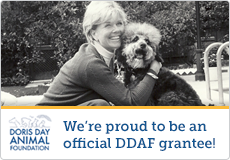| Detroit Free Press (MI)April 22, 1998
CREATURE COMFORTERS VOLUNTEERS BRING FOOD, WATER AND
HELP TO METRO DETROIT’S FOUR-FOOTED VICTIMS
Author: KIM NORTH Free Press Staff Writer
Looking into the bushy black dog’s Pontiac backyard,
it’s clear that his circumstances are lonely at best,
deadly at worst.
He’s lying on a bed of trash and broken glass near a
rusty, leaning shed. The rope attached to his collar is
tangled, giving him little room to move about, but he’s
luckier than many dogs in this neighborhood, where
people can barely afford to feed themselves much less
their pets.
He’s lucky enough not to be the blond dog named Bandit
who’s defying death several streets away, his ribs
protruding his skin. And he’s lucky enough not to be
lying dead in a dog house next to a chewed up butter
dish, like the nameless Labrador found around the corner
a month earlier.
No one is home at the furry black dog’s house, but that
doesn’t matter. The volunteers from the Michigan Animal
Care Network throw open the back of their white panel
truck and go to work.
Urinating from fear, the dog lunges viciously, but it
can’t deter these animal social workers.
This is how they spend their weekends, intervening in
the lives of neglected backyard pets in metro Detroit’s
poorest neighborhoods, where it’s common for litters of
pups to be passed out to neighbors, only to become
ignored when they grow up. People mistakenly believe
these hungry, tied-up creatures will be burglar alarms.
“People wonder why we care so much about animals when
children are starving as well, but what do we do, just
let them die and suffer?” asks Marie Skladd, president
of Animal Care Network. “There are just so many animals
out there that need our help.”
On their outings, volunteers also stress the basic rules
of pet ownership. And they try to persuade owners to
sterilize their pets, seek medical care or give them up
if they can’t take care of them.
The Animal Care Network is a non-profit organization
with one paid staff member. It’s run from a Livonia
office donated by Pet Supplies “Plus” owner Jack Berry,
who also provides supplies to the group.
The 4-year-old group is in danger of giving up its
Inkster route because of a lack of volunteers in that
area. And it recently started a Warren route, for which
it needs volunteers and supplies.
“If we can get another 20, 30 volunteers, maybe we can
go out in all three counties both days every weekend.
That would be our ultimate in goals,” says Skladd, the
driving force behind the group.
On a recent weekend, volunteers approached the furry
black dog with caution. And supplies. The rented white
truck contains food, water, bowls, dog houses, straw for
cold months, fly repellant to protect ears from looking
like ground beef in warm months, leashes and collars.
The dog is given several impromptu names — Sweetheart,
Honey, Baby. One member of the party distracts him with
water and bones, while the others rake up trash and
piles of pungent feces.
Slowly, it seems, the dog is figuring out that these
strangers are his angels. First, a tail wag, then a
changed expression and amazingly he’s accepting a
volunteer’s loving strokes.
“He wants to kill you until he finds out you’re here to
help him,” says Chris Whittlesey, the group’s Dr.
Doolittle to vicious dogs.
When the volunteers leave, the furry black dog’s shed is
cleaned and lined with straw. He has new bowls filled to
the brim, where he had none before, and he’s chewing on
a bone.
He’s also wearing a new purple collar because his was
too small.
“God, he looks like such a nice dog,” says Skladd, as
she leaves the network’s card at the front door.
The five-member team moves on to the next address, the
fourth of about 15 on the day’s list. That number
doubles as other dogs in need are spotted during the 8-
to 10-hour day.
The list of visits has been compiled by a block captain,
someone who knows the neighborhood well and who scans it
regularly for outdoor dogs in trouble.
The team makes stops at homes they’ve never visited
before and rechecks others. At Bandit and Bear’s home,
the owner, who has called the network for dog food, is
happy to see the volunteers again. So are his sons.
While some volunteers fill water bowls, spread out straw
and tidy up Bandit and Bear’s living area, others show
the boys how to walk the dogs.
Before they leave, the little boys insist on hugs and on
opening the car doors for the volunteers.
“It can be overwhelming at times, but I think there’s
enough of us that if we’re having a bad day we can get a
pick-me-up from each other,” Skladd says.
It’s common for the volunteers to see worn, weak dogs,
who’ve had no human contact, eat so fast that they throw
up. Others lap up water so furiously, they choke. Still
others are torn between eating and being touched by a
human.
On one stop, the group tended to four scarred pit bulls,
some missing parts of their ears — likely from
fighting. And rottweiler pups were found with rubber
bands on their tails to make them fall off.
“It’s so difficult because you know a lot of them are
dying a slow, painful death anyway, and not a lot of
people care,” Skladd says. “But we stay focused on the
fact that we give them TLC for one or two days and let
them go to sleep with a full stomach and shelter.”
For the black labrador found dead in his dog house at a
home surrounded by cars, it was too late.
“We didn’t make it. The captain said the little guy
looked bad when she drove by this week,” Skladd says.
But the volunteers don’t make stops alone in case owners
are hostile.
Skladd often wonders if the group is prolonging the
inevitable.
“Many will die,” she says. “But we focus on the ones we
get out of there and find homes for, or the ones we can
save from too tight collars. I just keep remembering all
the ones we have helped.” |




